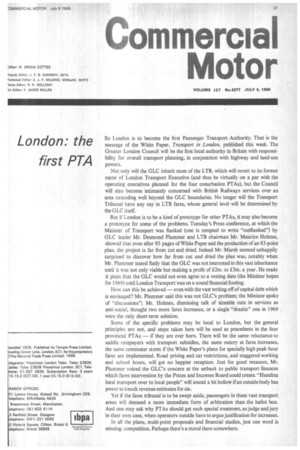London: the first PTA
Page 39

If you've noticed an error in this article please click here to report it so we can fix it.
So London is to become the first Passenger Transport Authority. That is the message of the White Paper, Transport in London, published this week. The Greater London Council will be the first local authority in Britain with responsibility for overall transport planning, in conjunction with highway and land-use powers.
Not only will the GLC inherit most of the LTB, which will revert to its former name of London Transport Executive (and thus be virtually on a par with the operating executives planned for the four conurbation PTAs), but the Council will also become intimately concerned with British Railways services over an area extending well beyond the GLC boundaries. No longer will the Transport Tribunal have any say in LTB fares, whose general level will be determined by the GLC itself.
But if London is to be a kind of prototype for other PTAs, it may also become a prototype for some of the problems. Tuesday's Press conference, at which the Minister of Transport was flanked (one is tempted to write "outflanked") by GLC leader Mr. Desmond Plummer and LTB chairman Mr. Maurice Holmes, showed that even after 85 pages of White Paper and the production of an 83-point plan, the project is far from cut and dried. Indeed Mr.. Marsh seemed unhappily surprised to discover how far from cut and dried the plan was, notably when Mr. Plummer stated flatly that the GLC was not interested in this vast inheritance until it was not only viable but making a profit of £2m. to £.3m. a year. He made it plain that the GLC would not even agree to a vesting date (the Minister hopes for 1969) until London Transport was on a sound financial footing.
How can this be achieved — even with the vast writing off of capital debt which is envisaged? Mr. Plummer said this was not GLC's problem; the Minister spoke of "discussions"; Mr. Holmes, dismissing talk of sizeable cuts in services as anti-social, thought two more fares increases, or a single "drastic" one in 1969 were the only short-term solution.
Some of the specific problems may be local to London, but the general principles are not, and steps taken here will be used as precedents in the four provincial PTAs — if they are ever born. There will be the same reluctance to saddle ratepayers with transport subsidies, the same outcry at fares increases, the same commuter storm if the White Paper's plans for specially high peak-hour fares are implemented. Road pricing and car restrictions, and staggered working and school hours, will get no happier reception. Just for good measure, Mr. Plummer voiced the GLC's concern at the setback to public transport finances which fares intervention by the Prices and Incomes Board could create. "Handing local transport over to local people" will sound a bit hollow if an outside body has power to knock revenue estimates for six.
Yet if the fares tribunal is to be swept aside, passengers in these vast transport areas will demand a more immediate form of arbitration than the ballot box. And one may ask why PTAs should get such special treatment, as judge and jury in their own case, when operators outside have to argue justification for increases.
In all the plans, multi-point proposals and financial studies, just one word is missing: competition. Perhaps there's a moral there somewhere.
























































































































































